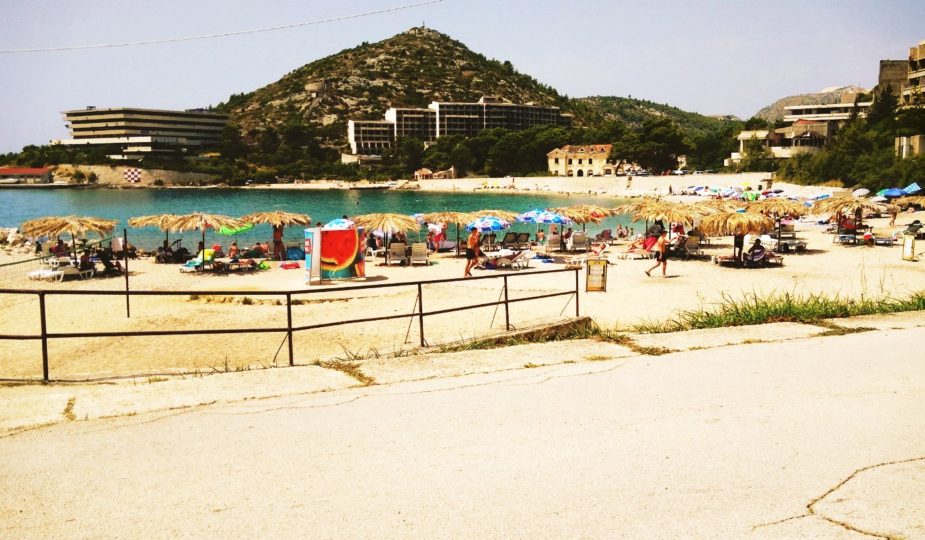
Grand Hotel Apocalypse
The common once-in-a-century pandemic turning into mental hell because this time it is taking place in neo-liberal times and the age of surveillance capitalism. The televised genocide on Palestinians, an Israeli Apartheid based on racial superiority that’s being feverishly supported in my country. A falling Empire that’s leaving the world with the monsters and masters it created: vast moral injury and dissonance, a military invention and colonial tool called ‘internet’ spreading surveillance and disinformation. A neo-feudal oligarchy of billionaire autists. The irreversible climate change as an outcome of Western industrialization and colonialism coming closer home- deadly floods at the gates of my home city Cologne and a first physical realization of climate change’s impact. Deadly floods in the Turkish Black Sea where my family originates from and where people feel the impact of the climate desaster for 20 years now, but who gives a shit. Devastating fires in the Turkish Mediterranean that I know so well, more apocalyptic fires in Greece, Italy, Russia, California… I almost don’t remember anymore when life was not all hellfires and floods, when life was not dissonance, trauma, and loss. A cosmic and strangely resigned sense of plague and impending doom is what established itself for me during the first half of this year. A year that we assumed would only get better after the vast confusion and hardships of 2020 but became worse instead. Feeling like a figure in Lars von Trier’s Melancholia waiting for the apocalypse, I decided to take a journey after thinking, for the first time in my life, “This might be the last time.“
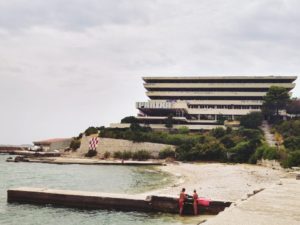 In Millenium People, his novel about the uprising and revolt of the descending middle class, J. G. Ballard characterizes tourism as the great soporific, a confidence trick that gives people the dangerous idea that there’s something interesting in their lives “But the suntans hide who they really are- salary slaves, with heads full of American rubbish. Travel is the last fantasy the 2oth Century left us, the delusion that going somewhere helps you reinvent yourself.” Fatality is not triggering that kind of journey of self-discovery trip or escapism in me, nor are there any signs of transcendence (“When Armageddon takes place, parking is going to be a major problem,” writes Ballard and coldly buries any hope of pathos and transcendence in our future suffering). Instead, I am drawn to unglamorous Europe beyond the polished spotlights and imperial metropoles, to a journey into the region where the last great European war raged in the 90s and left post-apocalyptic ruins within the landscape and its people’s souls: former Jugoslavia.
In Millenium People, his novel about the uprising and revolt of the descending middle class, J. G. Ballard characterizes tourism as the great soporific, a confidence trick that gives people the dangerous idea that there’s something interesting in their lives “But the suntans hide who they really are- salary slaves, with heads full of American rubbish. Travel is the last fantasy the 2oth Century left us, the delusion that going somewhere helps you reinvent yourself.” Fatality is not triggering that kind of journey of self-discovery trip or escapism in me, nor are there any signs of transcendence (“When Armageddon takes place, parking is going to be a major problem,” writes Ballard and coldly buries any hope of pathos and transcendence in our future suffering). Instead, I am drawn to unglamorous Europe beyond the polished spotlights and imperial metropoles, to a journey into the region where the last great European war raged in the 90s and left post-apocalyptic ruins within the landscape and its people’s souls: former Jugoslavia.
The reading that precedes my journey is Hannah Arendt’s Eichmann in Jerusalem, one of those classics that everybody loves to quote but nobody seems to read. How else can it be explained that Arendt’s “Banality of Evil” became one of the intellectual quotes of our time and evokes images of the mass extermination of Jews in Germany whilst Arendt’s lengthy analysis and criticism of Zionism in the book goes largely ignored? In her reporting of Eichmann’s trial in Jerusalem, Arendt lays out in detail the wide-ranging collaboration between Zionists and Hitler’s Third Reich, how the Zionist leadership in Germany closely collaborated with the Nazi’s in order to fulfill their deranged ideology in the establishment of a supremacist state of Israel, and how close the Zionist and Nazi ideology are in general. Eichmann testified in Jerusalem an attitude that he shared with many other Nazi functionaries, “Had I been a Jew, I would have been a fanatical Zionist. I could not imagine anything else. In fact, I would have been the most ardent Zionist imaginable.” Had he lived longer, Eichmann could have taken a lecture by current US president Joe Biden in 2007, when he declared “I am a Zionist. You don’t have to be a Jew to be a Zionist,” correctly pointing out that Zionism is a political movement that is rooted in 20th century nationalism and fascism, not spirituality or a Jewish faith. And so it is that today, Zionism in a Christian cloak as embodied by leaders such as Donald Trump and Joe Biden and spread by an apocalypse-seeking new gospel is the prevalent and most powerful form of Zionism and anti-semitism, as it smears an entire religion by tying it to a supremacist idea, and relentlessly crushes over all the many Jews opposing the fascist movement.
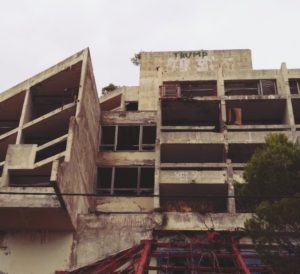 Living in times where anti-zionism, which is anti-nazism, is considered anti-semitic by people who cannot even correctly classify semites, and as a state rule in the Far West, you realize that things are completely inverted and upside down, and that the supremacist propaganda is even more advanced today than it was during the Third Reich. The Zionist state of Israel serves the West as a colonial manifesto, the placeholder for fascist and supremacist dogmas that have been made impossible in their own countries because of the past genocides of slavery, the Holocaust on Jews, the Congolese and the Togolese, and many other mass-exterminations like the ongoing ones in Middle Eastern countries. America, Germany and other colonial players are stuck in a mendacious loop of false repentance that they use as a justification for moral superiority and as a degenerated cover for ‘humanitarian interventionism’, which is nothing more than the continuation of white European fascism. Israel has by now become a proxy for the Far West, a possibility to cheer and sustain racial ideologies of chosenness and superiority without openly committing to them in their own societies. The last true resistance in Germany, the RAF, tried to warn us of the failed clown-show that was the “de-nazification” of the country, and naturally tied their resistance to the Palestinian case. But it was not until this year that I realized that the Nazis never lost the war but are still ruling, except by now they have established such a crude global system of tyranny, reverse truths and Goebbelian lies, that there can be no hope anymore, but one can only wait for the ruins of our civilization.
Living in times where anti-zionism, which is anti-nazism, is considered anti-semitic by people who cannot even correctly classify semites, and as a state rule in the Far West, you realize that things are completely inverted and upside down, and that the supremacist propaganda is even more advanced today than it was during the Third Reich. The Zionist state of Israel serves the West as a colonial manifesto, the placeholder for fascist and supremacist dogmas that have been made impossible in their own countries because of the past genocides of slavery, the Holocaust on Jews, the Congolese and the Togolese, and many other mass-exterminations like the ongoing ones in Middle Eastern countries. America, Germany and other colonial players are stuck in a mendacious loop of false repentance that they use as a justification for moral superiority and as a degenerated cover for ‘humanitarian interventionism’, which is nothing more than the continuation of white European fascism. Israel has by now become a proxy for the Far West, a possibility to cheer and sustain racial ideologies of chosenness and superiority without openly committing to them in their own societies. The last true resistance in Germany, the RAF, tried to warn us of the failed clown-show that was the “de-nazification” of the country, and naturally tied their resistance to the Palestinian case. But it was not until this year that I realized that the Nazis never lost the war but are still ruling, except by now they have established such a crude global system of tyranny, reverse truths and Goebbelian lies, that there can be no hope anymore, but one can only wait for the ruins of our civilization.
The route from Germany to South Croatia is a beautiful one- we pass by dark and plush German forests, and drive through the majestic Austrian Alps which merge into the Slovenian Alps through an arbitrary border drawn after the latest territorial war. Slovenia is beautiful and beautifully bizarre- its lonely gas stations are a haven of awkward vintage stoicism minus the neon lights. Eerily, most of the clearly inhabited houses’ windows remain dark after dawn, the restaurants are closed; the clean streets abandoned. While we’re driving through ghost city after ghost city, the mysterious local radio station MARŠ at 95.9 Mhz bleeps through the speakers with strange electronic sounds. Bruce Haack “Stand Up Lazarus” in the ghostly Slovenian night sprinkled with the blurry blue and red of the reflectors with 3D effect – my daughter is frightened. How much I have missed wild Europe.
After a night in a little mountainside hotel, we hit the road for Montenegro, where we want to stay for a few days before moving up to Croatia. Past the pastel, Italian-looking landscape of Istria and the endless blues of Dalmatia, we cross a green border and get lost in the Bosnian periphery. The Sierra Madre style valleys are painfully familiar to me from the war footage of Bosnian men fleeing into the mountains to escape the mass executions by Serbian troops. Lost for two hours on a rudimentary country road, we pass by abandoned houses, schools and village squares, all surrounded by lush, spring-green vegetation. We see only one old man there walking down the road with nowhere to go in this place deserted by all human souls – the last man standing. It is both devastating and oddly hopeful: Maps has collapsed and we’re lost because Google has not yet mapped the world here.
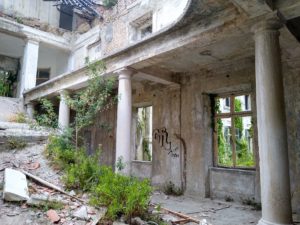 We pass two green borders when the Cyrillic signs appear and we are in Montenegro, before its independence in 2006 part of Serbia and Montenegro. The country is beyond beautiful with dark Aleppo fir trees throning over massive mountains which miraculously seem to line the sea from all four sides, from any point of view. The seaside resort Herceg Novi in the Bay of Kotor is rather unpleasant nevertheless, since the streets and beaches are crowded with coarse meatheads. It is difficult to spot a man or male child without a military haircut, and on our second day a local educates me on why this place feels like a fascist retreat: 600 Bosnians were slaughtered when the fortress was recaptured during the Yugoslavian war, which made the town a place of pilgrimage for Serbian nationalists. On Wikipedia & co we don’t find any information about this event, just as we will have difficulties to find information about all the many crime scenes in Palestine, Syria, Iraq, Afghanistan… Everything merges into a single abstract and faceless narrative, and the manifestations of horror have become manifestations of vast indifference. It’s the end of history as Jean Baudrillard suggested it. And it happened before, when after Hitler’s reign the Germans claimed to have not known about any atrocities and concentration camps while it happened, although millions of Jews and Roma, along with disabled and mentally ill people were transported from their neighborhoods, leaving their homes open for looting.
We pass two green borders when the Cyrillic signs appear and we are in Montenegro, before its independence in 2006 part of Serbia and Montenegro. The country is beyond beautiful with dark Aleppo fir trees throning over massive mountains which miraculously seem to line the sea from all four sides, from any point of view. The seaside resort Herceg Novi in the Bay of Kotor is rather unpleasant nevertheless, since the streets and beaches are crowded with coarse meatheads. It is difficult to spot a man or male child without a military haircut, and on our second day a local educates me on why this place feels like a fascist retreat: 600 Bosnians were slaughtered when the fortress was recaptured during the Yugoslavian war, which made the town a place of pilgrimage for Serbian nationalists. On Wikipedia & co we don’t find any information about this event, just as we will have difficulties to find information about all the many crime scenes in Palestine, Syria, Iraq, Afghanistan… Everything merges into a single abstract and faceless narrative, and the manifestations of horror have become manifestations of vast indifference. It’s the end of history as Jean Baudrillard suggested it. And it happened before, when after Hitler’s reign the Germans claimed to have not known about any atrocities and concentration camps while it happened, although millions of Jews and Roma, along with disabled and mentally ill people were transported from their neighborhoods, leaving their homes open for looting.
It’s not even an hour’s drive to the Croatian border from here, and after a cold-war-era welcome by a Croatian police officer asking for bribes, we finally arrive at our destination Mlini, a beautiful seaside village 5 miles from Dubrovnik. Mlini has a little known tourist attraction of the different kind: the bay of Kupari with its Yugoslav-era elite resort in ruins. From a distance, the three massive buildings towering over the gorgeous bay look like the many other brutalist hotel blocks from the communist era. But as soon as you lounge down and blink the panorama into focus, you slowly realize that the faded glamour sitting on prime real-estate is in reality a bombed-out one. The formerly opulent military resort was the peak of elegance and playground of the Yugoslav People’s Army up until 1991 when the territorial war broke out and the army bombarded and burned their former holiday spot by using phosphorous bombs. If Herceg Novi felt like being at a beach in Tel Aviv, this here feels like Gaza, or Lebanon, or Yemen.
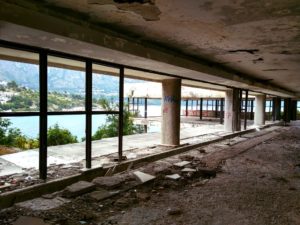 After a few beers in the beaming midday sun, I set out to explore the 30-year-old ruins which will disappear this winter after global investors came in to build luxury hotels in their place. The ruins in danger of collapsing are unsecured and open to anyone who wants to explore them at their own risk- unimaginable in over-regulated Germany. It was never cleaned up here. The buildings are littered with bullet holes and graffiti, which in this part of Europe have never entered a post-modern phase: “PANICA” shouts it from one facade, names, vulgarities, king morbidities and cartoons are sprayed on the walls. Climbing the once impressive stairs to the hotels is difficult as every tile and anything of value has been completely looted. Floor after floor is a testament of desolation and destruction, landscapes of rudiments and dust. Collapsed ceilings, pools filled with rubble, and behind the burst windows always the blue of the Adriatic Sea.
After a few beers in the beaming midday sun, I set out to explore the 30-year-old ruins which will disappear this winter after global investors came in to build luxury hotels in their place. The ruins in danger of collapsing are unsecured and open to anyone who wants to explore them at their own risk- unimaginable in over-regulated Germany. It was never cleaned up here. The buildings are littered with bullet holes and graffiti, which in this part of Europe have never entered a post-modern phase: “PANICA” shouts it from one facade, names, vulgarities, king morbidities and cartoons are sprayed on the walls. Climbing the once impressive stairs to the hotels is difficult as every tile and anything of value has been completely looted. Floor after floor is a testament of desolation and destruction, landscapes of rudiments and dust. Collapsed ceilings, pools filled with rubble, and behind the burst windows always the blue of the Adriatic Sea.
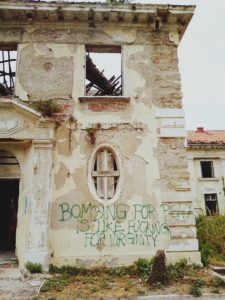 Immortalized on the walls of the Grand Hotel’s side entrance is a graffiti which paralyzes me for a few minutes, “Bombing for peace is like fucking for virginity”. I must think of Drone King Obama’s Nobel Peace Prize, and of Virgin Mary. The terror and sadism of the past shines through and hits you without a warning. There is no doubt that this haunted place was the backdrop for terrible atrocities during and after the war. A lonely skeleton of a chair, placed strangely in the middle of the room, difficult to say whether it’s rusty or burned. Rotten mattresses in otherwise empty rooms. Interrogation. Torture. Rapes. Executions. Perhaps war seems acceptable to so many of us because there is something temporary attached to it, the certainty that it will end, the delusory promise of renewal and rebirth which might spread even to those not regionally affected from it.
Immortalized on the walls of the Grand Hotel’s side entrance is a graffiti which paralyzes me for a few minutes, “Bombing for peace is like fucking for virginity”. I must think of Drone King Obama’s Nobel Peace Prize, and of Virgin Mary. The terror and sadism of the past shines through and hits you without a warning. There is no doubt that this haunted place was the backdrop for terrible atrocities during and after the war. A lonely skeleton of a chair, placed strangely in the middle of the room, difficult to say whether it’s rusty or burned. Rotten mattresses in otherwise empty rooms. Interrogation. Torture. Rapes. Executions. Perhaps war seems acceptable to so many of us because there is something temporary attached to it, the certainty that it will end, the delusory promise of renewal and rebirth which might spread even to those not regionally affected from it.
The old grandeur of the hotels also shimmers through, but is largely left to imagination: a piece of sophisticated wallpaper on the cracked walls, a small island of undamaged tile ornaments, a lavishly curved staircase that leads to the old ballroom. Instead, a new venue of beauty has formed inside the ruins. Similar to Chernobyl, over time nature has started to claim back the area and vegetation pervades through every crack. In cavernous halls now grows ivy and weeds, gradually swallowing entire fountains. Trees have sprouted up in the rooms and are now home to stray cats. Especially in the centerpiece building, the Grand Hotel with its brick facade and stucco ceilings, all of this seems like an enchanted deep sleep, a lazy triumph. The whole scenery is not just a healthy injection of vanitas, but a glimpse into the future: this beautiful planet will go on to exist and give birth to civilizations long after the last one of us have left it, and ultimately nature will even reclaim the doomed billionaire bunkers in New Zealand. A comedy genius has sprayed “Trump” on the very tip of one of the destroyed hotels. Intended or not, he created a perfect symbol of our civilizational future: crumbling, ruinous Trump Towers and Empire Buildings everywhere, in line with Pentagon predictions about military bases buried in water. It’s just a shame that everything else also goes down with it. Some want to call it climate change alone, but it is so much more that ate up our time on Earth. It turns out that a Nazi civilization consumes the world in time lapse, and its destruction is as precise as we know it.
the last one of us have left it, and ultimately nature will even reclaim the doomed billionaire bunkers in New Zealand. A comedy genius has sprayed “Trump” on the very tip of one of the destroyed hotels. Intended or not, he created a perfect symbol of our civilizational future: crumbling, ruinous Trump Towers and Empire Buildings everywhere, in line with Pentagon predictions about military bases buried in water. It’s just a shame that everything else also goes down with it. Some want to call it climate change alone, but it is so much more that ate up our time on Earth. It turns out that a Nazi civilization consumes the world in time lapse, and its destruction is as precise as we know it.
by Saliha Enzenauer
I can feel the shadows of the past
And a black spider on my brain
How they bite my dreams
The truth is a lie
And it’s as if
And it’s as if
We’re damned
I want to kill time
Only shadows remain
Head wandering through emptiness
Turns and falls a long fall
And it’s as if
And it’s as if
We’re damned
But (still) we await
an invitation to Heaven
To Heaven
Phantasmagoria “Poziv U Raj” (1989)
